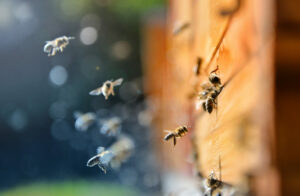Technology has helped dairy farmers be more efficient and make better management decisions for years. Now beekeepers are able to do something similar for their bees.
“With younger beekeepers entering our industry, technology is starting to play a role in beekeeping management,” says Wayne Steigelman, beekeeper from Brown County. I am using Broodminder sensors in my hives to monitor temperature, humidity, weight and even vibration of the hives to better monitor the health of the honeybees.”
By the placement of the sensors you can tell both the size and position of the cluster, which gives the beekeeper valuable management information without opening the hive. By using this technology, he has been able to increase his production.
“A Wisconsin hive averages around 65 pounds of honey per season. I was able to harvest 720 pounds from just five hives this past year.”
He recently worked with Melliforal, a Wisconsin based company, to provide a complete pollen analysis of his honey. This is new to the industry and gives customers transparency to the authenticity and pollen components.
“The pollen analysis can show the consumer the pollen sources of the honey if they are using it for allergies. Also, by knowing the sources the bees are foraging on we can work with farmers to help manage the timing of their pesticide treatments. For example soybeans.”
Steigelman as well as other beekeepers will also be tracking what happens to their bees during the upcoming Eclipse by using “BeeDar.”
“The lives of honey bees are intertwined with the sun. They are most active during daylight and use it as a navigational tool. So when the Eclipse happens, we’ll now get to see how flexible bees are in response to changes in their environment.”

